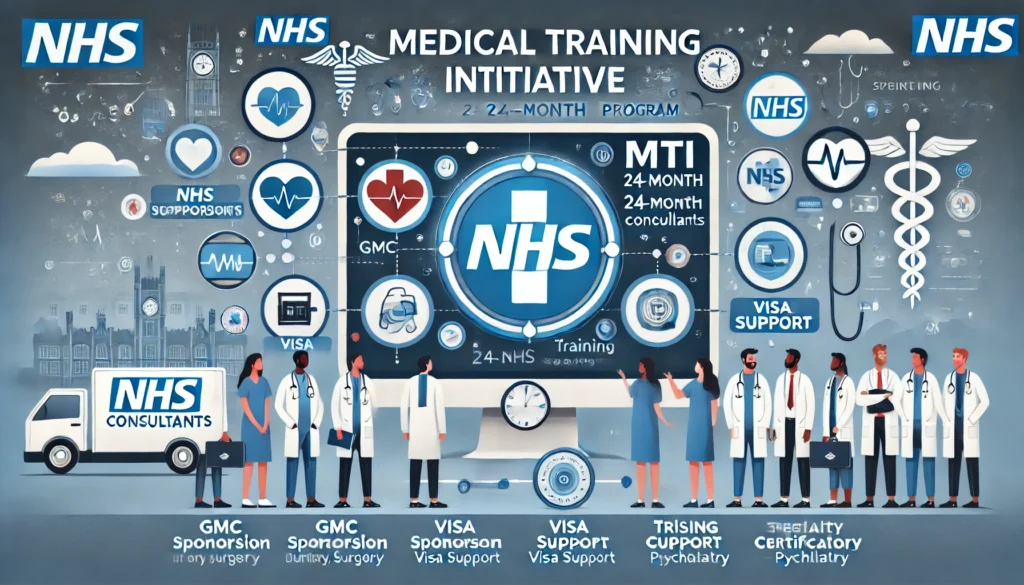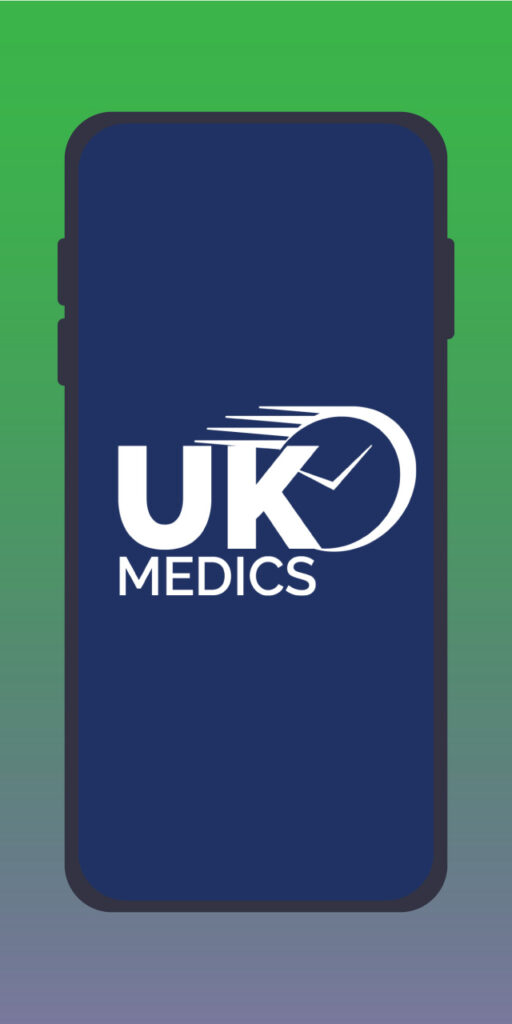The Medical Training Initiative (MTI) is a British-based programme which allows doctors from overseas to enhance their skills through the NHS for a period of up to 24 months. This program benefits both physicians who participate and the healthcare system in their countries of origin in enhancing their knowledge before returning.
What is the Medical Training Initiative (MTI)?
MTI is a collaborative effort that MTI is a joint initiative that involves:
- Royal Colleges
- NHS Trusts
- Deaneries/LETBs
- Academy of Medical Royal Colleges (AoMRC)
MTI program lets foreign doctors or IMG doctors receive special training in medicine and gain expertise under the direction of NHS experts, empowering their skills to help improve healthcare delivery within their home countries.
Key Features of the MTI Program:
- Duration: Up to 24 months of training within the NHS.
- Sponsorship for GMC Registration: Doctors can obtain GMC registration without the need to pass PLAB or hold UK-recognized postgraduate qualifications.
- Visa Support: Tier 5 visa sponsorship facilitated by the AoMRC.
- Training Certificates: Doctors receive either a Diploma in UK Medical Practice (DipUKMP) or a certificate of completion, depending on the sponsor.
Benefits of the MTI Program
The MTI scheme offers a host of advantages for participants:
Professional Development:
- Comprehensive training under NHS consultants.
- Opportunity to sit for the Royal College Part 2/final exams in some specialties.
- Access to workshops, seminars, and medical conferences.
Recognition and Credentials:
- Participants sponsored by Royal Colleges receive the DipUKMP, while others receive a certificate of completion.
Salary and Employment Benefits:
- Doctors earn a salary equivalent to their NHS counterparts in similar roles.
- Eligibility to bring dependents to the UK.
Simplified GMC Registration:
- MTI participants are able to get GMC registration via sponsorship and avoiding PLAB Pathway, facilitating their admission into the NHS.
What are the eligibility requirements for MTI?
The criteria for MTI eligibility vary slightly between different fields, however the basic conditions are the following:
General Criteria:
- Primary Medical Qualification (PMQ): It must be recognised as such by GMC and validated by EPIC.
- Postgraduate Qualification: Possess qualifications such as MRCP Part 1, MD, or equivalent in the relevant specialty.
- Clinical Experience: At least three years of post-qualification experience, including:
- One year of internship.
- One year in the specialty intended for training.
- Recent Practice: At least 3 out of the last 5 years in clinical practice, including the 12 months prior to GMC registration.
- English Language Proficiency: Valid IELTS or OET scores meeting GMC requirements.
- Good Standing: Certificate of Good Standing (CGS) from medical regulatory bodies of all countries practiced in during the last five years.
Specialty-Specific Criteria:
Each Royal College may have additional requirements. For instance, the Royal College of Physicians (RCP) requires:
- Competency equivalent to a UK graduate completing Core Medical Training (CMT).
- EPIC verification for PMQ and other documents.
Application Process for MTI
The MTI application process is multi-faceted, involving several stakeholders:
- Identify MTI Opportunities
- Check specialty-specific MTI posts through respective Royal Colleges or NHS Trusts.
- Confirm eligibility requirements for your chosen specialty.
- Secure Sponsorship
- Sponsorship is obtained through a Royal College or a government/third-party agency in your home country.
- Prepare Documents
Essential documents include:
- Verified PMQ.
- Postgraduate qualification certificates.
- Certificate of Good Standing (CGS).
- IELTS/OET scores.
- A comprehensive CV highlighting clinical experience and competencies.
- Obtain GMC Registration
- Sponsorship from the Royal College or AoMRC facilitates GMC registration without PLAB.
- Apply for a Tier 5 Visa
- The AoMRC works with UKVI to issue a Certificate of Sponsorship (CoS) for a Tier 5 visa.
Pros and Cons of the MTI Program
Advantages:
- No PLAB Requirement: Participants gain GMC registration through sponsorship.
- Structured Training: Access to supervised training posts with designated NHS consultants.
- Salary and Benefits: Equivalent pay to NHS doctors and eligibility to bring dependents.
- Professional Growth: Opportunity to take Royal College exams and gain UK healthcare experience.
Challenges:
- Limited Specialty Posts: Availability depends on NHS workforce needs and Royal College collaborations.
- No Contribution to ILR: Time on a Tier 5 visa does not count towards Indefinite Leave to Remain (ILR).
- Complex Process: The application process involves significant paperwork and coordination.
- Adjustment Period: Adapting to the NHS system may be challenging initially.
Is the MTI Right for You?
The MTI offers a great occasion to
- Doctors who are seeking UK experiences to improve their clinical abilities.
- Health professionals who are planning to return their homelands for a role in improving healthcare.
- Doctors who are aiming to pass Royal College membership exams during their time in.
But, MTI may not be ideal for
- Doctors looking to settle permanently in the UK (as Tier 5 visas do not lead to ILR).
- Senior doctors with extensive experience and membership in Royal Colleges, as the program may not significantly advance their careers.
Specialties Participating in MTI
The MTI program spans a variety of specialties. Applications must be made through the relevant Royal College. Some examples include:
- Royal College of Physicians (RCP)
- Royal College of Surgeons (RCS)
- Royal College of Obstetricians and Gynaecologists (RCOG)
- Royal College of Paediatrics and Child Health (RCPCH)
- Royal College of Psychiatrists
- Royal College of Emergency Medicine (RCEM)
If your specialty isn’t listed, contact the MTI team at AoMRC for guidance.
Conclusion
The Medical Training Initiative (MTI) is a unique way for IMGs to get valuable experience within the NHS and to improve their skills as professionals, and improve the quality of healthcare in their countries of origin. Although it has its certain limitations, including limits on settlements and settlement, it is an excellent step for physicians looking to develop their profession and reach internationally acknowledged standards of training. If they are able to navigate the system and understanding its significance, IMGs can make the maximum of this incredible possibility.









